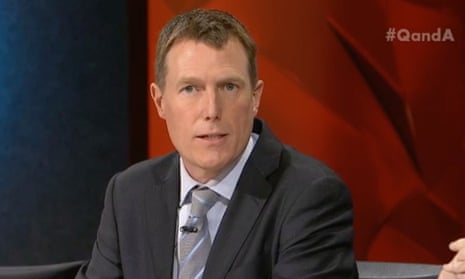The social services minister, Christian Porter, has defended Centrelink’s automated compliance system as “about as reasonable a process as you could possibly derive”.
The system, which began in July, has been the subject of a string of complaints in the past month, as anger grows over its crude use of data-matching to compare income reported to Centrelink with information held by the Australian tax office.
Roughly 169,000 Australians, including those with disabilities, have now received letters from the government, warning them the data-matching has detected a discrepancy in their income information.
Those individuals are given 21 days to prove they are eligible for welfare received up to six years ago, or they will incur a debt and a 10% “debt recovery fee”. If they fail to pay, individuals are referred to debt collectors, and the human services minister, Alan Tudge, has previously threatened them with jail.
Porter defended the system on Tuesday morning, saying it was fair and reasonable, and that only 276 complaints had been received so far.
“I think that this is about as reasonable a process as you could possibly derive,” Porter told ABC Radio National.
A formal complaint, however, is different from lodging a dispute against a welfare debt. Porter would not say how many disputes had been lodged against welfare debts.
He dismissed calls for the system to be suspended, saying it had now identified $300m of overpayments to welfare recipients.
Porter said individuals who disagreed with Centrelink’s notice had plenty of opportunity to contest it.
“Ultimately, if a real discrepancy does exist then eventually we raise a debt, and that happens much later than this initial letter, and even then, there are many days in which you can dispute that debt, if you think that a mistake has been made,” he said.
“Then, when a repayment is arranged, it is arranged in a way that is financially suitable to the individual.
“It really is an incredibly reasonable process, the question is why wasn’t the previous government, Labor, when they were in charge, engaging in this process.”
He sought to clarify that the initial letters sent out to welfare recipients were not “debt letters”, despite the fact that, if not responded to, they will automatically lead to a debt.
The data-matching process appears to suffer from two main errors.
In some cases, it has been shown to have crudely averaged out ATO information on a person’s yearly income across all of Centrelink’s 26 fortnightly reporting periods.
Queenslander Michael Griffin, for example, was taken to have earned $1,000 every fortnight because his annual income was $26,000.
That does not take into account circumstances where a person has only worked for part of year, and is otherwise eligible for benefits.
A Centrelink whistleblower previously told Guardian Australia that many of those contacted by the agency were simply paying the debt without question.
The source, who reviewed hundreds of cases where disputes were lodged, said only about 20 had turned out to be genuine.
Legal Aid Victoria also fears that many individuals are not receiving correspondence from Centrelink, and are being lumped with the debt by default.
Others say long waiting times on Centrelink’s phone system or problems with its online portal have prevented them from lodging a dispute within 21 days.

Comments (…)
Sign in or create your Guardian account to join the discussion